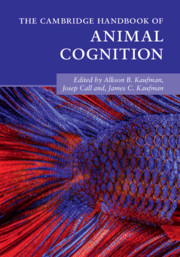Book contents
- The Cambridge Handbook of Animal Cognition
- The Cambridge Handbook of Animal Cognition
- Copyright page
- Dedication
- Contents
- Figures, Tables, and Boxes
- Contributors
- Acknowledgments
- Introduction
- Part I Communication and Language
- 1 Animal Communication Overview
- 2 Communication in Ant Societies
- 3 Symbolic Communication in the Grey Parrot
- 4 Communication in Dogs and Wolves
- 5 Semantic Communication in Primates
- Part II Memory and Recall
- Part III Social Cognition
- Part IV Social Learning and Teaching
- Part V Numerical and Quantitative Abilities
- Part VI Innovation and Problem-Solving
- Index
- References
5 - Semantic Communication in Primates
from Part I - Communication and Language
Published online by Cambridge University Press: 01 July 2021
- The Cambridge Handbook of Animal Cognition
- The Cambridge Handbook of Animal Cognition
- Copyright page
- Dedication
- Contents
- Figures, Tables, and Boxes
- Contributors
- Acknowledgments
- Introduction
- Part I Communication and Language
- 1 Animal Communication Overview
- 2 Communication in Ant Societies
- 3 Symbolic Communication in the Grey Parrot
- 4 Communication in Dogs and Wolves
- 5 Semantic Communication in Primates
- Part II Memory and Recall
- Part III Social Cognition
- Part IV Social Learning and Teaching
- Part V Numerical and Quantitative Abilities
- Part VI Innovation and Problem-Solving
- Index
- References
Summary
Semantic communication is about transmitting mental representations of reality. Three research questions address the nature of this process in primates. Can primates produce signals that are meaningful in a lexical sense? Are they capable of compositional semantics? Can they create and infer meaning by integrating context and intention? There is good evidence that, as recipients, primates have capacities at all three levels, whereas for signallers the evidence is less compelling. This difference may have cognitive roots, due to the fact that primate signallers are typically engaged in the here-and-now and, unlike humans, less able to refer to memory content. Future research will have to clarify what mental structures primates can take into account during communication, including entities that are not physically present.
Keywords
Information
- Type
- Chapter
- Information
- The Cambridge Handbook of Animal Cognition , pp. 100 - 114Publisher: Cambridge University PressPrint publication year: 2021
